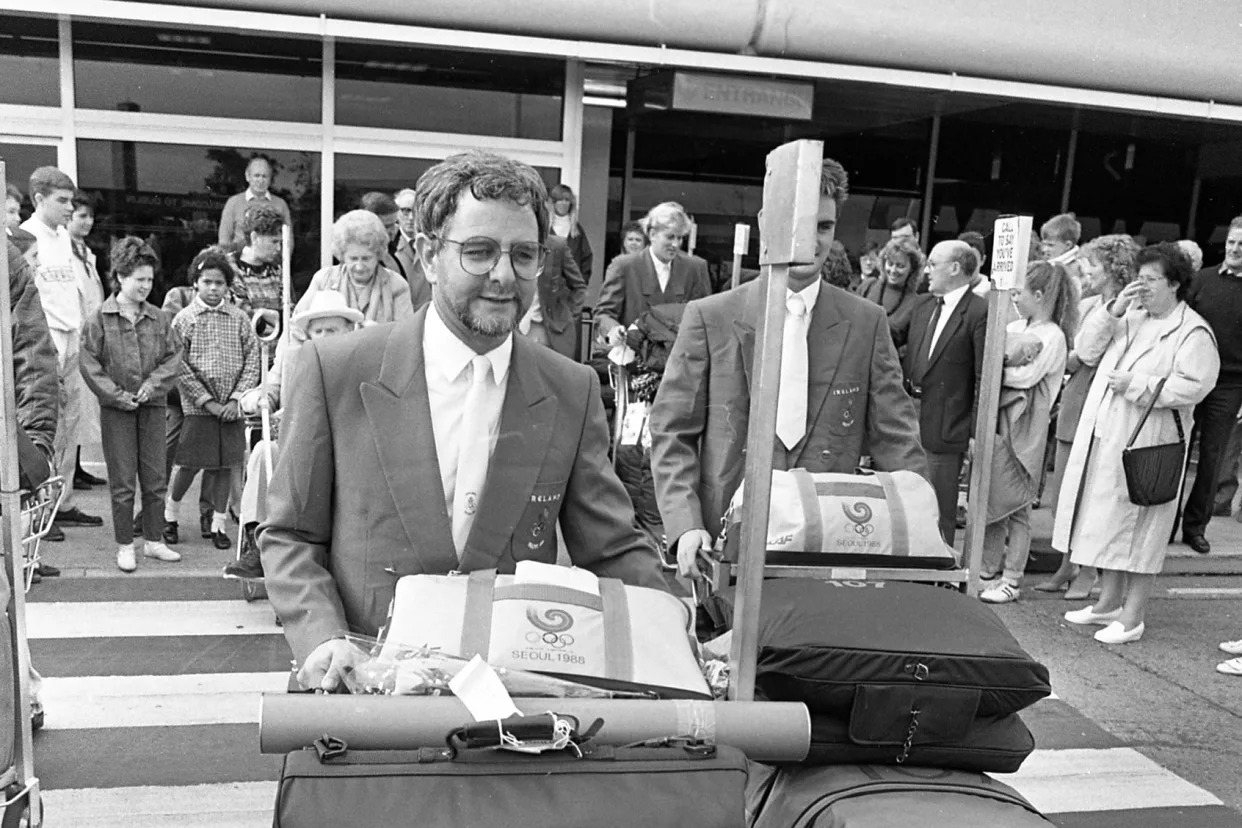Another accused sex offender in the sports world, sheltered by U.S., may finally face justice
Irvin Muchnick
Sun, November 19, 2023

George Gibney Photo by Independent News and Media/Getty Images
So far, one of the biggest current news stories in Ireland has gone completely unremarked upon in American media. It involves what followers of competitive swimming — there, here and everywhere — need to understand about the fate of George John Gibney, coach of the Irish Olympic swimming team in 1984 and 1988, who has been living as a quasi-fugitive in the U.S. for more than a quarter of a century.
Survivors of Gibney’s many alleged and well documented acts of sexual abuse may stand to get some relief from the Irish judicial system at long last. Missing from the associated commentary is a larger truth: This very late dragnet, if it happens, will still leave open the problem of “accountability delayed, accountability denied.” The enablers of this monster have intertwined in the worldwide institutional cover-ups that help youth sports coach sexual abuse continue to thrive.
Multiple Irish news outlets are reporting that the Garda Síochána, Ireland's national police agency, has forwarded to the director of public prosecutions a recommendation to indict Gibney on up to 50 counts of sexual assault, based on evidence brought forward by newly emerging victims. Further, the reports say, U.S. authorities have been alerted that a request to extradite Gibney from Florida may be forthcoming.
The BBC, producer of the 2020 podcast series “Where Is George Gibney?”, by Irish journalist Mark Horgan, said 18 survivors gave the gardaí information on fresh incidents, never before investigated, during the production and its aftermath. This evidence, aimed at a new generation of news consumers not quite as fatigued by one of Ireland's nearly innumerable legacies of abuse in high places, could be breaking through the DPP’s resistance, nearly 30 years running, to undertake a second Gibney prosecution.
The first prosecution 1.0 came undone thanks to a controversial 1994 Irish Supreme Court ruling, which found that the passage of time had fatally compromised Gibney’s right to a fair trial, after he was indicted the previous year on 27 counts of indecent carnal knowledge of juveniles. One of the barristers who argued Gibney’s case, Patrick Gageby, is the brother of Supreme Court justice Susan Denham (later the chief justice). This level of nepotism is not unfamiliar in Ireland (or, to be fair, in many other places).
The following year, Gibney made it to the U.S. on the basis of a precious diversity lottery visa. The timeline suggests he’d been keeping the visa in his pocket for the right moment. Gibney even briefly coached for a USA Swimming age-group program in suburban Denver before his past caught up with him in that community.
In 1998, a cryptically composed Irish government report found that Gibney’s victims “were vindicated” by the evidence that had been accumulated in various cases. But the DPP never reopened the original case, which would have involved challenging the Supreme Court’s shaky legal scholarship with respect to historical abuses — a doctrine no longer favored in the case law.
Hats off to BBC podcaster Horgan if his effort has succeeded in returning Gibney to Ireland in handcuffs. At the same time, “Where Is George Gibney?” tiptoed around unpleasantness like the apparent corruption Supreme Court and the likely collusion of the American Swimming Coaches Association in arranging Gibney's relocation and reinstallation on our side of the Atlantic.
Asked about Gibney at a deposition for a lawsuit alleging USA Swimming’s responsibility in the abuses of another coach, the group’s then-chief executive, Chuck Wielgus — already accused by some of giving false or misleading testimony in other abuse cases — said, “Sounds like a — sounds like an Irish — is he an Irish coach? Yeah, I think I’ve heard the name.” (In 2014, a petition campaign by abuse survivors forced the International Swimming Hall of Fame to rescind Wielgus’ induction. He died three years later.)
In my FOIA case for material from Gibney’s immigration records, federal judge Charles Breyer said in 2016, “I have to assume that if somebody has been charged with the types of offenses that Mr. Gibney has been charged with, the United States, absent other circumstances, would not grant a visa. We’re not a refuge for pedophiles.” This was just before the FOIA settlement at the Ninth Circuit Court of Appeals, which included the release of a letter in which ICE officials determined that Gibney was not a candidate for deportation, even after he withheld from his failed 2010 U.S. citizenship application the information that he had been prosecuted for sex crimes in his native country. ICE’s rationale was that since Gibney had never been convicted of anything, the U.S. would not revoke his green card for false statements on a citizenship application. One wonders whether the same standards would apply to an immigrant from a different part of the world with a different skin color
None of that was in the BBC podcast. Following the FOIA case, FBI agents were dispatched to Peru to investigate Gibney’s travel there on a children's medical mission, along with a group from his Catholic parish in Colorado. Gibney was then, and may still be, under investigation at the Justice Department’s Money Laundering and Asset Recovery Section, in a probe directed by the unit’s human trafficking finance specialist. That wasn’t mentioned in “Where Is George Gibney?” either.
We Americans are in no position, however, to lecture the Irish on the timidity of their news media. Several years ago, major newspapers here reported on a federal grand jury investigation of USA Swimming in the Southern District of New York, related to insurance fraud and cover-up of abuse cases. It has barely been mentioned since.
No comments:
Post a Comment